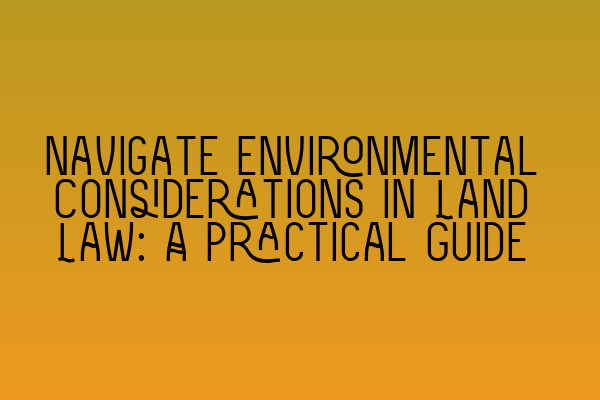Navigate Environmental Considerations in Land Law: A Practical Guide
Introduction
When dealing with property law and land law matters, it is crucial to understand and navigate the various environmental considerations that may arise. Environmental issues can significantly impact the use, development, and value of land. This practical guide aims to provide you with essential information and insights to help you effectively navigate environmental considerations in land law.
Understanding Environmental Considerations
Before delving into the practical aspects, it is essential to have a clear understanding of what environmental considerations entail in the context of land law. Environmental considerations primarily encompass potential contamination, pollution, and other adverse effects on the environment and human health. These considerations can arise from previous land uses, hazardous substances, waste disposal, and various other activities.
Identifying Potential Environmental Issues
The first step in navigating environmental considerations is to identify potential issues. This involves conducting thorough due diligence and investigations, including land searches, surveys, and environmental audits. These assessments help identify any past or present environmental contamination, the risks associated with the land, and potential liabilities that may arise.
Having a comprehensive understanding of potential environmental issues allows you to assess the impact on your client’s intended use or development plans for the land. It also helps determine the necessary steps to address or mitigate these issues to comply with legal requirements and protect your client’s interests.
Complying with Environmental Laws and Regulations
Once potential environmental issues are identified, it is crucial to understand and comply with the relevant environmental laws and regulations. These laws vary depending on the jurisdiction and may encompass legislation addressing pollution, waste management, land contamination, and conservation.
Complying with environmental laws requires staying updated on any changes or updates. Regularly consulting legal resources and participating in professional development programs can help ensure your knowledge remains current and applicable to your clients’ needs. Professional organizations, such as SQE Property Law & Land Law, often offer webinars and resources that provide expert insights and guidance on environmental considerations in land law.
Addressing and Mitigating Environmental Issues
Once potential environmental issues are identified and the relevant laws and regulations are understood, it is necessary to address and mitigate these issues. This may involve engaging environmental consultants, experts, or remediation contractors to assess the contamination, develop remediation plans, and execute necessary actions to mitigate the risks and restore the land to an acceptable state.
It is crucial to work closely with your clients, environmental experts, and relevant authorities to ensure all necessary permits, approvals, and clearances are obtained along the way. This may include obtaining consent from environmental regulators, local authorities, or other entities governing land use and environmental protection.
Considering Environmental Clauses in Contracts
When dealing with land transactions, contracts should include provisions that account for environmental considerations. Environmental clauses can set out obligations, representations, and warranties that address environmental issues and allocate responsibilities between parties. These clauses can help protect your client’s interests and ensure compliance with environmental laws.
Understanding the implications of environmental clauses and their impact on your client’s rights and limitations is crucial. For a deeper understanding of contractual capacity, rights, and limitations, check out this informative article.
Conclusion
Navigating environmental considerations in land law requires a holistic approach that involves identifying potential issues, complying with environmental laws, addressing and mitigating issues, and considering environmental clauses in contracts. By understanding the relevant legal framework and obtaining expert guidance, you can effectively navigate environmental considerations and protect your clients’ interests in property and land transactions.
To further enhance your knowledge and test your understanding of contract law, consider exploring these helpful resources:
